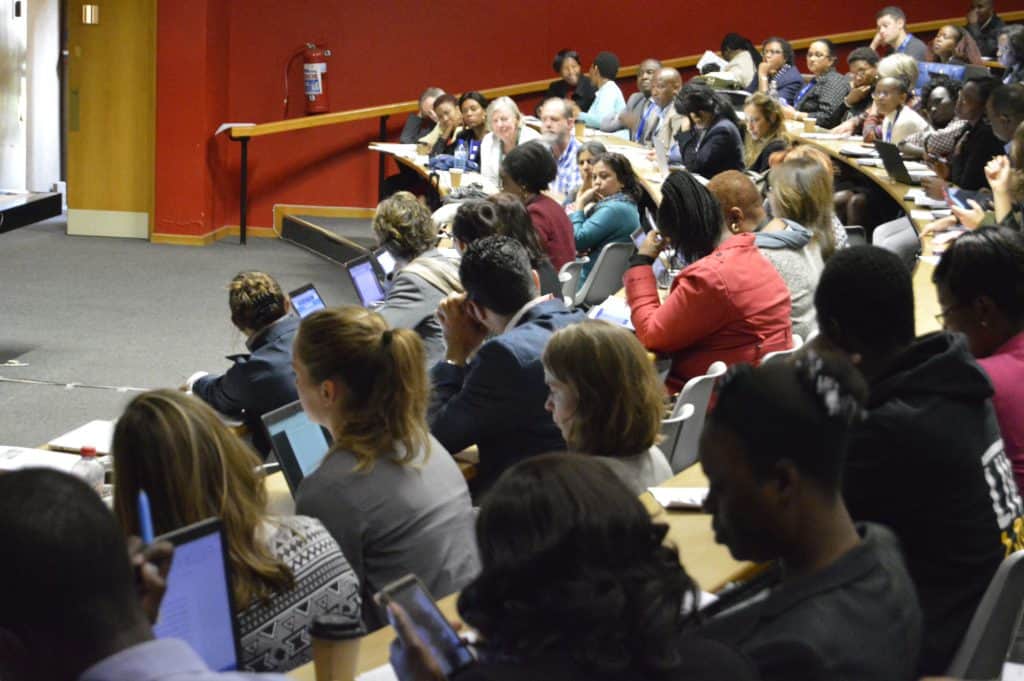
“South Africa is a country that suffers simultaneously from the problems of affluence and poverty, and both of these are a result of nutritional challenges that shape the world we live in.” So said health activist and researcher Prof David Sanders, speaking at the World Nutrition Congress 2016, hosted by the University of the Western Cape (UWC) from 30 August 2016 to 2 September 2016.
Researchers, policymakers and advocates from around the globe took to the stage to discuss, debate and share insights on how to address “The Double Burden of Malnutrition In A Globalised World” – a world in which some eat too little and some eat too much, and far too many eat in an unhealthy way, for a variety of reasons. It’s a world, as Sanders explained, in which nutrition may be as big a challenge for society today as HIV/AIDS has been for the last 15 years.
Obesity is increasing at alarming rates – and undernutrition remains at high levels, especially in Africa and South Asia. And given that South Africa has the highest rate of obesity in Africa (amongst the top 10 in the world), it is appropriate that the country won the bid to host this vitally important discussion – the second annual international convention of the World Public Health Nutrition Association (WPHNA).
Participants from a variety of fields, ranging from land and agriculture to dietetics, health systems, and economic and political studies, came together to address these issues.
Prof Carlos Monteiro from the University of Sao Paulo, Brazil, delivered the keynote presentation of the Congress, Healthy diets must prevent all forms of malnutrition and promote sustainable food systems, and consider the impact of food systems on diet and nutrition, and discussed how Brazil (host of last year’s Congress) had successfully tackled child malnutrition.
UWC’s Professor Ben Cousins set the tone of the plenary theme, examining in his presentation the impact of food systems on diet, nutrition and livelihood, Cheap and nasty: the contradictions of capitalist food regimes. A number of congress speakers mentioned several disquieting facts about nutrition, malnutrition and food security – for example:
-
-
Although food availability in sub-Saharan Africa has increased by nearly 12% over the past two decades, implying that more people have more food on their plates, the total number of undernourished people continues to increase. The figure sits at an estimated 220 million.
-
-
-
25% of South Africa’s children are undernourished. Good nutrition and the health of mothers and their children during the first 1 000 days – from conception to about two years old – is a unique window of opportunity for later human development.
-
Aside from diabetes, there are a number of other growing health concerns attributed to the ‘foods’ we consume – such as the prevalence of anaemia, persisting high rates of Vitamin A deficiency, and a broad range of biological, behavioural, societal and structural aberrations.
-
UWC and the University of Pretoria are co-hosts of the prestigious DST-NRF Centre of Excellence for Research in Food Security, which has initiated an active policy-oriented research programme that spans the full range of issues in food security, and also hosts the SA-UK Bilateral Research Chair in Social Protection for Food Security.
“It’s an honour for UWC to host this second global conference of the World Public Health Nutrition Association, and to welcome from all continents so many eminent and committed researchers, policymakers, practitioners and advocates in this field of nutrition and food,” said UWC Rector and Vice-Chancellor, Prof Tyrone Pretorius. “This field is not only critical to health, well-being and economic development, but also profoundly intersectoral and interdisciplinary, making this an area that involves all sectors of government and civil society – worldwide.”
Article also available here
related Articles
Poor have borne the brunt of “inappropriate” Covid-19 regulations, experts say
The loss of jobs and desperately needed revenue to the state resulting from Covid-19-related restrictions will negatively impact the critical…
Humanities take centre stage at postgraduate conference on food studies
This is according to Professor Desiree Lewis, Principal Investigator of the Critical Food Studies: Transdisciplinary Humanities Approaches Programme, an intra-institutional…
UN Week of Science and Peace Conference
As Africans, we must tap into our mental and natural resources and work together to develop scientific and technologically…



